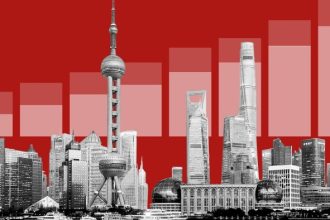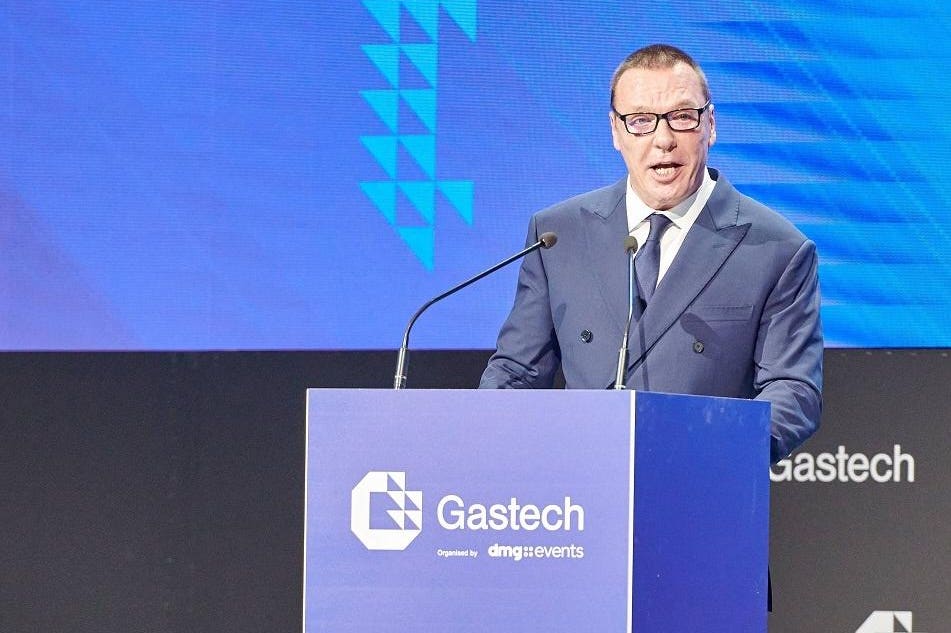International energy industry gatherings play a pivotal role in shaping humanity’s quest for a sustainable, yet secure and affordable energy future, according to a leading events industry head.
Speaking to Forbes, Christopher Hudson, President of dmg events – an organizer of over 30 global energy events in a typical calendar year – says the industry is increasingly being called to account over climate change, lowering emissions and meeting net zero targets. “Consequently, the world is witnessing a big push towards decarbonization by energy producing companies and countries. But discussions over the journey need to be pragmatic, agile and innovative – that’s where we come in.”
Describing his global team that organizes summits and shows stretching from Japan to Nigeria, including the natural gas industry’s decades old fixture Gastech and the Abu Dhabi International Petroleum Exhibition and Conference (ADIPEC), Hudson says they are “enablers” of exchanges that shape the future of an entire industry.
“Embracing the challenge of lowering emissions must include realistic considerations about energy supply / demand fundamentals, security of supply and consumer affordability. The onus is us (and our competitors) to shape ground-breaking events reflecting those themes.
“From dmg events’ perspective, we employ people who live and breathe energy. That’s not just limited to hydrocarbons – we’re talking everything from renewables to nuclear power. In producing events content, we like to anticipate the next big issue, technology or strategy that might pique our clients’ interests.
“We also engage with think-tanks, consultancies, educational institutions and energy economists who help us shape our global programs. Often, we host events for companies and governments, but we never produce content just because some wants to pay for it – in the sense of sponsored content. Nor is it a cutting and pasting exercise of putting together broadly similar events in different settings where the industry just talks to itself in a bubble.”
Hudson says such an approach is crucial for facilitating healthy policymaking, corporate decisions, innovation and partnership agreements – the envisioned outcome following the conclusion of any event.
“We have technical streams, business streams and socio-political themes. We take ownership of the slant of the narratives, welcome opposing viewpoints, strategies and approaches, because those are the hallmarks of a constructive dialog.
“We never lose sight of emerging climate issues as well as addressing the vexing challenges of energy poverty and how low carbon initiatives may negatively impact energy producers reliant on hydrocarbon income streams.” Afterall, how can net zero be achieved without finding common ground as well as cross-sector collaboration on lowering carbon emissions, especially Scope 3 emissions.
Dark days of Covid and all those virtual events
With so much at stake and pivotal exchanges to be had, nothing can supplant direct engagement with peers in a physical setting – unless a global pandemic scuppers it. When that happened in 2020 as Covid-19 sent the world into lockdown, and the energy industry did its own introspection on a very changed world, the events business was severely dented.
Hudson recalls how dmg events couldn’t book a single physical event from March 2020 up to September 2021, when global Covid vaccinations finally helped with opening up the world.
“No one new how we would come out of Covid. We all tried virtual conferences, putting on tons of digital content for our clients and that perennial fight for attention spans of people stuck at home with laptops. However, when that world went, we couldn’t quite anticipate the desire for all of us to mingle and interact in the physical world.”
Much to Hudson’s delight, many of dmg events’ big shows have seen a huge return to the market, not just matching but exceeding pre-Covid attendance levels. For context, at ADIPEC 2019, the company’s data flagged 130,000 attendees, 1,800 exhibiting companies and 20 energy ministers. Ahead of ADIPEC 2023, it already has 2,300 confirmed exhibitors, 40 energy ministers and anticipates over 160,000 attendees.
“This is a huge resurgence, not just a restoration of pre-Covid levels. Of course, as an events company we have taken on board our digital learnings and tools from the dark days of Covid, and are wiser and more commercially savvy. But nothing beats an in-person exchange as our data suggests.”
What’s more, in a globalized setting with a greater emphasis on agility and process optimization, practically every show is international these days.
“Take ADIPEC for instance – we will have over 30 global trade delegations in Abu Dhabi making it a bilateral event. It’s not just regional governments talking to each other. Rather we’ll see unique engagements, for instance between European companies engaging with their African counterparts or U.S. companies holding talks with Latin American peers – all at an event in the Middle East; one that has come a long way from being just a Gulf Cooperation Council (GCC) event.”
An evolving energy mix and S.T.E.M talent
Profound changes triggered by an evolving energy mix can only be good for the industry, and Hudson believes “Big Oil” is not heading for its Kodak moment. At least not just yet.
“At some stage in the future, the world would not have as much reliance on oil as it presently does. But there’s no international consensus on when we’ll get there and some suggest it is several decades away. However, we can directly testify to the seriousness of global discussions about funding a just energy transition and the oil and gas sector’s own evolution and portfolio adjustments.”
Industry experts point to natural gas replacing coal as the bridging fuel to a low carbon future and Hudson says feedback from clients lends credence to this belief. “The golden age of gas has arrived and coal is on borrowed time. Rising global Liquified Natural Gas (LNG) cargoes point to it, especially those heading to Europe following geopolitical complications created by Russia’s invasion of Ukraine. Global trade volumes came in at 400MT for 2022, an uptick of 60 MT or 18%.”
Energy players – including some of the biggest names in the oil and gas business – are also investing heavily in hydrogen, with a project pipeline of $700 billion by the end of this decade. “It’s why we regularly include content on hydrogen at major events. I believe in the future of hydrogen. It’s just a question of unlocking it. Cleaner hydrogen predicated fuel systems will most certainly be part of the future energy mix courtesy human ingenuity.”
And it’s not just an exciting time for dmg events and its peers, but for science, technology, engineering, and mathematics (S.T.E.M) students too, he adds. “The energy industry is no longer just about people on oil and gas rigs drilling for hydrocarbons, but also renewables, battery storage, hydrogen economy, biofuels and other emerging technologies. It is becoming an increasingly attractive place for young people to work in, and that’s something we can happily vouch for.”
Read the full article here





